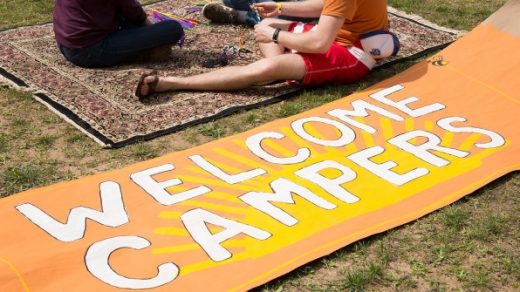How The Wild Honey Pie Is Reinventing The Music Festival Business
Over the past few years, the music festival industry has ballooned into a corporate-backed money machine that has become less about the music and more about creating a scene.
Coachella, which is owned by AEG Live, pulled in $114 million last year, becoming the first recurring festival to cross the $100 million mark. Back in 2016, Desert Trip, also owned by AEG Live, became the highest-grossing festival on record, raking in $160 million in revenue. Even though many other festivals haven’t necessarily reached the rarified air of a Coachella, that hasn’t stopped AEG Live or its rival Live Nation from pumping new festivals into an already saturated market.
The idea of “peak festival” has been well documented with sound arguments against corporations marginalizing smaller, independent festivals, as well as lineups becoming carbon copies of each other–and that peak festival fatigue is starting to show in the numbers. Bonnaroo’s attendance hit an all-time low in 2016. Sasquatch’s numbers dropped by more than half that same year. And earlier this month, AEG Live canceled this year’s FYF Fest in Los Angeles due to dismal ticket sales, despite having a stacked lineup that included Janet Jackson, Future, and Florence + The Machine.
Eric Weiner has been watching all of this play out, while steadily building a veritable counterattack to the festival glut with his sixth-annual Welcome Campers, a three-day festival that puts the focus on community and music discovery.
“I don’t think there’s a whole lot of innovation in the music festival industry right now,” Weiner says. “We’re not trying to take anyone down. We’re just trying to react to what we see and what we’ve experienced. I’ve been going to festivals since I was able to, and this is just our reaction as music fans to what we want.”
Welcome Campers is just one prong of Weiner’s company The Wild Honey Pie. In addition to live events and the editorial content they push on their site, The Wild Honey Pie hosts recording sessions that are released and monetized on streaming platforms and YouTube. The Wild Honey Pie also doubles as a production company for outside clients. But no matter where Weiner diversifies his company, the overarching mission is the same: to build communities around new and emerging artists–something that he feels is missing not just from the festival circuit, but the music industry as a whole.
“There’s so much music out there. It’s cheaper to make it than ever before. All you have to do is sign up for TuneCore and you can release your own music–you don’t need a label,” says Weiner. “So the role of the curator is more important than ever. We’re dedicating our entire company to music discovery in the sense that wherever you are, whatever platform you prefer, we are where you are, helping you find the music that you’re going to fall in love with.”
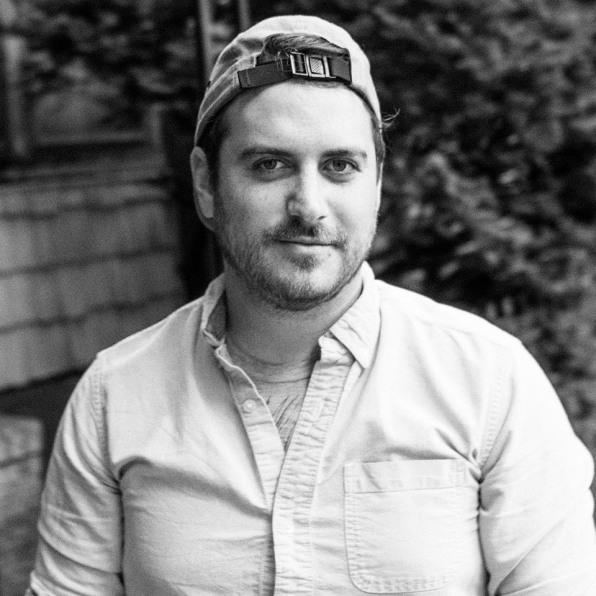
Weiner started The Wild Honey Pie as a music blog in 2009 while working as an intern at MTV. Having access to free concerts spurred him to write album reviews, which then led to managing a small staff of contributors. At the time, it was just a side project, but then The Wild Honey Pie started curating live shows and potential for more began to show.
“When we turned one year old as a company, we threw a birthday party. We booked five bands, and we sold it out,” Weiner says. “It was one of those moments where I remember thinking I could build a community around this. There is something to be said for not only discovering new artists, but building a community around the connection that fans can make with an artist in an intimate setting.”
Fast-forward to 2013 when Weiner was struck with the idea of turning his parents’ property on a lake in Westchester, New York, into a summer camp-esque concert venue. With the indie music cachet The Wild Honey Pie’s blog built up, Weiner was able to snag online magazine Consequence of Sound to co-present the first-ever Welcome Campers, not to mention secure Squarespace as a sponsor.
“I danced in the rain,” Weiner recalls. “And that was the moment I thought we could make money and we could be a business.”
For the first three years, Welcome Campers was a free event–one only had to enter their email address to sign up. Although The Wild Honey Pie lost money in those initial years, it was building a solid mailing list used to push what Weiner refers to as the the company’s three core pillars: video content, events, and editorial. In 2015, The Wild Honey Pie started selling tickets to their live events, putting together marketing campaigns, and even started getting into the creative agency space by creating music-related events for brands.
Weiner’s dream of making The Wild Honey Pie a viable business was coming true–and then, in that same year, he hit a major personal snag.
“I had a paranoid schizophrenic episode where I landed in the psych ward,” Weiner says. “It took me away from The Wild Honey Pie for eight months.”
Before he left, Weiner secured a deal with SpinMedia to produce some of their content, so he felt his company would be in a stable position while he was away–he was wrong. “I came back and we had been losing money,” he says. “So I laid off employees and refocused who we are, what we do, and what we’re building.”
Aside from business deals going by the wayside during his absence, Weiner says he also had to navigate restoring faith within his employees that he was mentally sound enough to lead the company.
“I had some struggles throughout 2016 where the staff didn’t know what I could handle. Most people don’t know how to treat someone that has dealt with mental health issues,” Weiner says. “And so I struggled for eight months being an employee at my own company, feeling like I was on the outside looking in.”
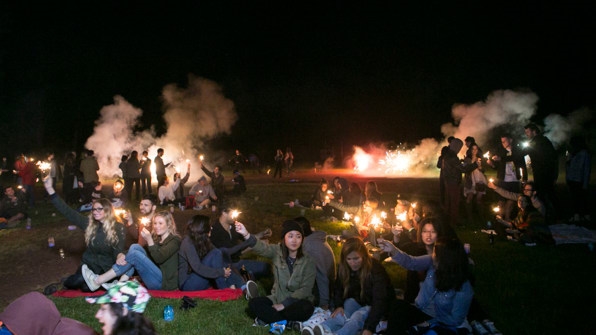
Weiner used that period of adjustment to reassess The Wild Honey Pie’s focus toward retooling their website, producing more video content, and developing more events that “break down the barrier between artist and fan because listening to a song on Spotify isn’t enough–you really have to build connections that will create lifelong consumers and fans,” Weiner says. “And that makes us valuable to artists, labels, booking agents, and management companies. And it makes us valuable to fans as well.”
Weiner added The Wild Honey Pie dinners to the company’s offerings earlier this year, a ticketed and intimate event that takes over a restaurant for an evening of food and music. The Wild Honey Pie dinners are currently only in New York City on a monthly basis, but Weiner plans to up the frequency and expand to Los Angeles, Chicago, Austin, and London.
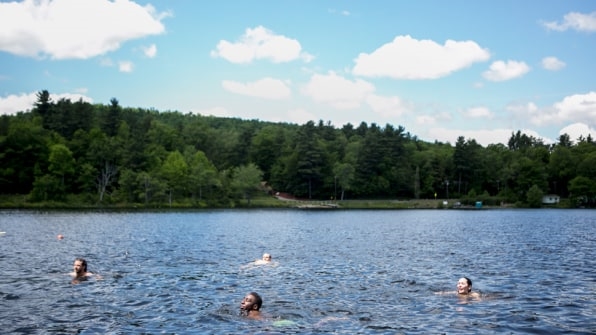
“I see no reason for this not to be in five cities. I see no reason for this not to be once a week. The demand is there–every single dinner party we’ve done has sold out,” Weiner says. “They trust our music taste and that’s really important because at the crux of everything at The Wild Honey Pie, we’re all about our music taste and curating music. But they’re not buying tickets for the artists–they’re buying it for the experience.”
The experience Weiner is referring to is based on being in an environment where you’re able to connect with the band and the people around you. It’s why Welcome Campers caps its attendees at the relatively low number of around 400. Coachella, by comparison, averaged 125,000 daily attendees last year.
“It’s more about honing in on what we do, and refining and building out more of these experiences than it is growing the size of them,” Weiner says. “We’re not looking to make Welcome Campers a 15,000-person music festival. We think that would really diminish what’s so beautiful about it. But if we’re able to replicate it multiple times a year, we can charge more sponsors, create more video content–we could increase the reach.”
Weiner has been adamant about not having outside investors, relying solely on meaningful brand partnerships, those that fit within The Wild Honey Pie’s ecosystem. This year’s Welcome Campers’ partners include Clif Bar, Polar Beverages, and Pilot Kombucha, which actually doubled their investment this year versus last year.
“Because it’s only 400 people, you’re meeting and making more genuine relationships and friends at this festival than you do at much larger music festivals, and that same mentality makes it valuable to brands,” Weiner says. “So [brands] send a couple of reps and they make friends with everyone all weekend. And then the next time [a festival attendee] is choosing between Pilot Kombucha and another kombucha company, which one do you think they would choose?”
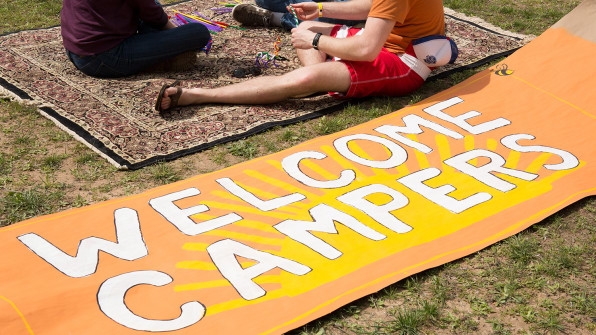
Weiner believes it’s only a matter of time before the bigger festivals catch wise to the value of thinking smaller and getting back to what he considers the most important part about the festival experience.
“I feel like music, more than anything in the world, brings people together. And yet it still feels like I go to a concert, I’m standing there alone, or I’m talking to the friends I came with,” Weiner says. “Music could be more social, and I think our events really do achieve that.”
(12)

